Gene Expression & Epigenetics
What are Gene Expression & Epigenetics?
“Gene expression” refers to the process by which a DNA sequence (i.e. a gene) is used to make a specific RNA or protein, while "epigenetics" refers to the ways phenotypes are impacted by factors other than genetic sequence (e.g. gene repression by chromatin packing). Research into Gene Expression & Epigenetics aims to understand how our genes and the way they are regulated influence who we are. How is DNA passed safely to the next generation? How do parental life experiences impact offspring phenotypes without affecting their gene sequences? How do cells that contain the same DNA sequence end up looking so different from one other (e.g. one of your brain cells compared to one of your muscle cells)? Answering these questions will bring a new understanding to the code of life.
What is the impact of our research in Gene Expression & Epigenetics?
- Environmental conditions experienced by parents can influence gene expression patterns in their offspring. Work in our department has identified new mechanisms of transgenerational inheritance where information is passed through the biologically paternal lineage to embryos developing in the uterus. Find out more here.
- Studies of how bacteria make the walls that protect them from our immune system may lead to the development of new or improved antibiotics to address the growing threat of antibiotic resistance. Find out more here.
- Work in our department has developed a rapid evolution computational protocol whereby the fitness of thousands of mutations of any given gene can be assessed simultaneously. Find out more here.
Who's studying Genes Expression & Epigenetics?
-
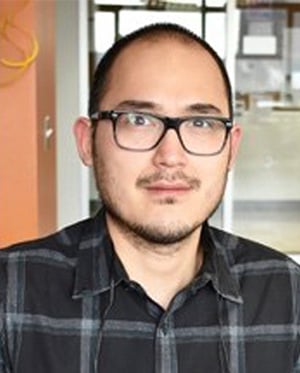
Josué Flores Kim , PhD
Assistant Professor of Biochemistry & Molecular Biotechnology.Type: Primary
Areas of Research: Biochemical Mechanisms, Cellular Biochemistry, Gene Expression & Epigenetics
Research Interest: The Flores Kim lab studies how bacteria build their cell envelopes and how antimicrobials disrupt these processes.
Key Words: bacterial cell envelope; antibiotic resistance; antibiotic tolerance
Research Tools: We use a combination of classical, modern and chemical genetic screens with biochemical and high-resolution imaging analyses.
Broader Impact: drug resistant and tolerant bacterial infectionshe/him/his
Office Location: LRB 915
Lab Location: LRB 970 U
Phone: 508-856-6260
Lab Page -

Anthony Imbalzano , PhD
Professor of Biochemistry & Molecular Biotechnology; Associate Dean of Academic Affairs in the Morningside Graduate School for Biomedical Sciences; Associate Dean in the Office for Postdoctoral ScholarsType: Primary
Areas of Research: Biochemical Mechanisms, Cellular Biochemistry, Gene Expression & Epigenetics
Research Interest: The Imbalzano Lab studies the role of chromatin remodeling in cell fate specification and maintenance.
Key Words: Chromatin remodeling, gene expression, development, cancer, mesenchymal cells, myogenesis, adipogenesis
Research Tools: Cell Culture, M. musculus (mouse)
Broader Impact: Breast Cancerhe/him/his
Office Location: LRB 813
Lab Location: LRB 870 H
Phone: 508-856-1029
Lab Page -
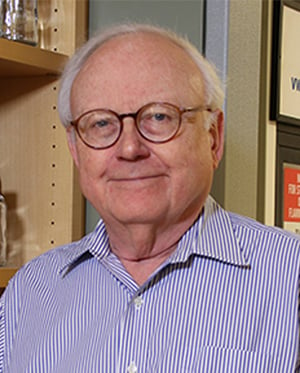
Thoru Pederson , PhD
Professor of Biochemistry & Molecular Biotechnology; Vitold Arnett Professor of Cell BiologyType: Primary
Areas of Research: Gene Expression & Epigenetics
Research Interest: The Pederson lab researches RNA biosynthesis in the nucleolus.
Key Words: RNA biosynthesis; RNA-protein interactions; the nucleolus; chromosome dynamics
Research Tools: mammalian cell culturehe/him/his
Office Location: LRB 821
Lab Location: (n/a)
Phone: 508-856-8667
Lab Page -

Peter Pryciak , PhD
Associate Professor of Biochemistry & Molecular BiotechnologyType: Primary
Areas of Research: Biochemical Mechanisms, Cellular Biochemistry, Gene Expression & Epigenetics
Research Interest: Dr. Pryciak studies how protein kinases regulate cell signaling and the cell cycle.
Key Words: MAP kinases (MAPKs), cyclin-dependent kinases (CDKs), short linear motifs (SLiMs)
Research Tools: S. cerevisiae (yeast)Office Location: LRB 822
Lab Location: LRB 870 P
Phone: 508-856-8756
Lab Page -

Oliver J. Rando , MD, PhD
Endowed Chair in Biochemistry and Molecular Biotechnology I; Professor of Biochemistry & Molecular BiotechnologyType: Primary
Areas of Research: Cellular Biochemistry, Computational Biochemistry, Gene Expression & Epigenetics
Research Interest: The Rando Lab studies the role of epigenetic inheritance in programming health and disease.
Key Words: epigenetics, chromatin, small non-coding RNA, embryology, spermatogenesis
Research Tools: S. cerevisiae (yeast), M. musculus (mouse), C. elegans (nematode worm)
Broader Impact: Paternal environments can affect diabetes, metabolic syndrome, anxiety, schizophrenia and more.he/him/his
Office Location: LRB 906
Lab Location: LRB 940 A-C &
LRB 970 X-Y
Phone: 508-856-8879
Lab Page -

Sy Redding , PhD
Assistant Professor of Biochemistry & Molecular BiotechnologyType: Primary
Areas of Research: Biochemical Mechanisms, Biophysics & Macromolecular Structures, Gene Expression & Epigenetics
Research Interest: The Redding Lab seeks to discover general physical principles that affect how genetic information is organized and accessed.
Key Words: Chromatin organization, protein-DNA interactions, Epigenetics, single molecule biophysics, phase separation
Research Tools: single molecule techniques, TIRF microscopy, confocal microscopy.he/him/his
Office Location: LRB 926
Lab Location: LRB 960 B
Phone: 774-455-6635
Lab Page -
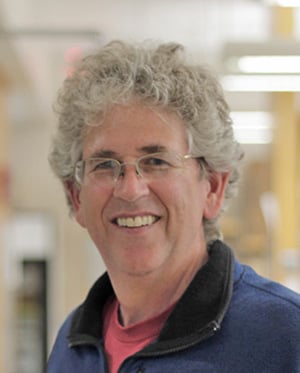
Nick Rhind , PhD
Professor of Biochemistry & Molecular BiotechnologyType: Primary
Areas of Research: Biochemical Mechanisms, Cellular Biochemistry, Gene Expression & Epigenetics
Research Interest: The Rhind lab studies cell size regulation and temporal coordination of DNA replication
Key Words: DNA replication, cell cycle, cell size, replication kinetics
Research Tools: S. cerevisiae (yeast)
Broader Impact: CancerOffice Location: LRB 904
Lab Location: LRB 940 E-D
Phone: 508-856-8316
Lab Page -
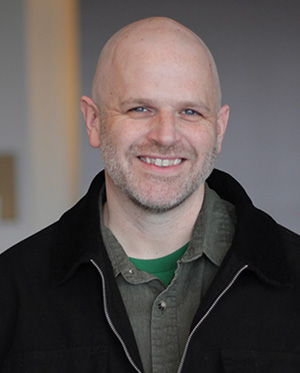
Sean Ryder , PhD
Professor of Biochemistry & Molecular Biotechnology; Vice Chair of Outreach for the Biochemistry & Molecular Biotechnology DepartmentType: Primary
Areas of Research: Cellular Biochemistry, Gene Expression & Epigenetics
Research Interest: The Ryder Lab studies the role of egg (maternal) mRNA in embryonic development.
Key Words: RNA, oogenesis, embryogenesis, germline development, protein-RNA interactions
Research Tools: C. elegans (nematode worm)
Broader Impact: Reproductive health, microdeletion syndromes, genome editing, RNA therapeuticshe/him/his
Office Location: LRB 906
Lab Location: LRB 970 W
Phone: 508-856-1372
Lab Page -
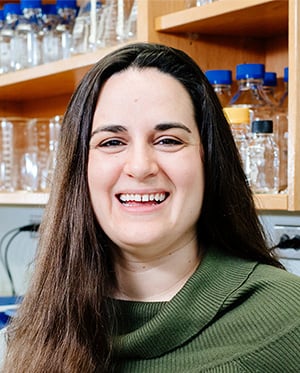
Summer Thyme , PhD
Assistant Professor of Biochemistry & Molecular BiotechnologyType: Primary
Areas of Research: Cellular Biochemistry, Computational Biochemistry, Gene Expression & Epigenetics
Research Interest: The Thyme Lab studies neurodevelopmental disorders using zebrafish.
Key Words: zebrafish, neurodevelopmental disorder, intellectual disability, Down syndrome, drug discovery, computation, genomics, mRNA, scRNA-seq, genome-editing, CRISPR, protein engineering
Research Tools: zebrafish, CRISPR
Broader Impact: developing treatments for intellectual disability in neurodevelopmental disorders.Office Location: LRB 803
Lab Location: LRB 870 R/S
Phone: 508-856-3251
Lab Page
x
x
Relevant Blog Posts
-
 Jul 31, 2024Read more
Jul 31, 2024Read more -
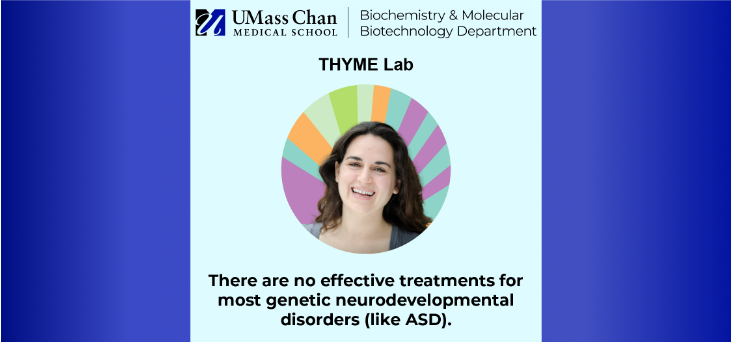 Apr 1, 2024
Apr 1, 2024Autism Awareness Day - Featuring the Thyme Lab
Read more -
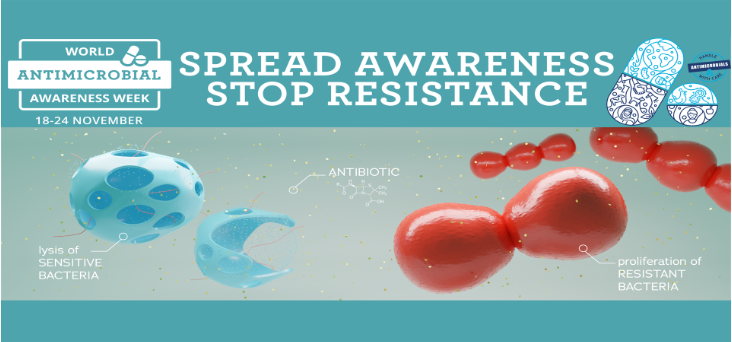 Nov 17, 2023
Nov 17, 2023World Antimicrobial Resistance Awareness Week, 2023
Read more -
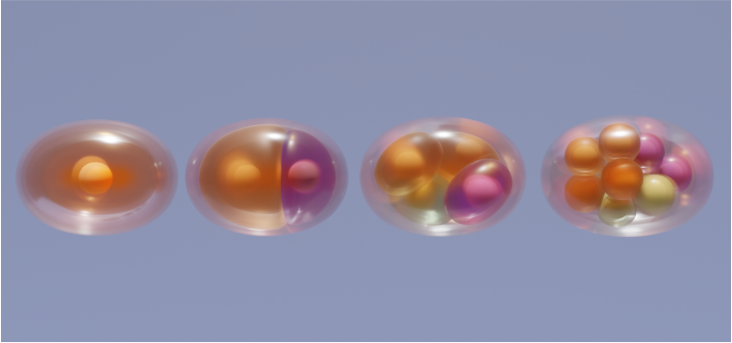 May 12, 2023
May 12, 2023Happy Mother's Day from the BMB!
Read more -
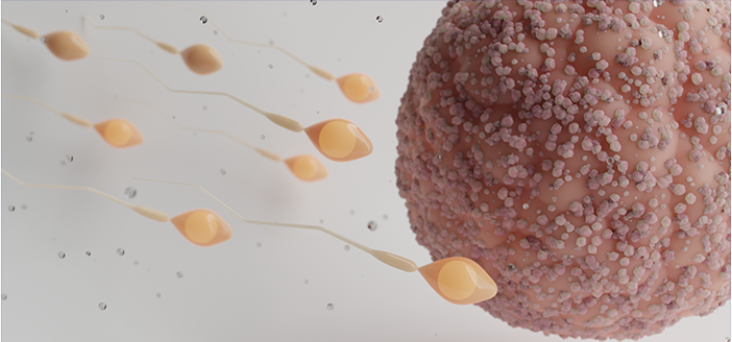 Apr 27, 2023
Apr 27, 2023Donor Conception Awareness Day
Read more
Molecular illustrations on this webpage were generated by Leonora Martínez-Núñez, PhD.
